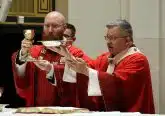A Closer Look: Character Determines the Circumstances of Our Lives
For many Catholics, the most difficult and distressing effect of social distancing has been the suspension of Masses and other public liturgies. Prior to March 2020, many of us cannot remember the last time we missed Mass on Sunday or a Holy Day of Obligation. The Church’s liturgies are where we Catholics come to find out who are, and to become who we are supposed to be. Our lives
are properly ordered by and toward the sacrifice of the Mass. So, in this time of deprivation of the full participation in the liturgy – especially the Mass – our lives are, quite literally, disordered.
And, of course, this is a time of great sorrow. On the other hand, however, this can – and perhaps should – be among the most spiritually enriching experiences of our lifetimes.
The Unchosen Discipline
We Catholics recognize the importance of penance and deprivation, both to express sorrow for our sins and to develop the virtues that equip us to live morally and spiritually flourishing lives. But because we often choose them, there is a sense in which we have “control” over our penances and spiritual disciplines. Even when the priest imposes penance in Confession, we maintain a significant level of control, both about whether we go to Confession, and when and how we do our penance. This is not to deny their sincerity and efficacy, but how much more can we claim the spiritual benefits of discipline that we don’t choose, but rather is imposed upon us?
Claim Your Life
The acclaimed moral theologian Stanley Hauerwas said, “Character determines circumstance, even when the circumstance may be forced upon us, by our very ability to interpret our actions in a story that accounts for moral activity.” He closely associates this idea with his understanding of human “agency.” We typically think of agency as the capacity of the human person to make moral choices – the ability and moral skill to choose X instead of Y.
While this is correct as far as it goes, Hauerwas challenges us not to limit ourselves to this somewhat superficial definition. Instead, he explains that agency is “the word we use to remind
us that we are beings who have the capacity to claim our lives by learning to grow in a truthful narrative.”
Understood this way, moral agency is not primarily an account of our ability to choose X instead of Y. Rather, it is concerned with how we order our lives in a truthful way when Y is imposed
upon us when we prefer X. What do we do then? What choices do we make? How do we incorporate Y into our lives in a truthful manner? The answer is based upon the character that we have developed prior to the imposition of Y. This is how agency determines character and character determines circumstance.
We did not choose the raw reality of a highly infectious disease keeping us from the Sacraments. But the way we claim our lives in the face of this reality – the way we exercise moral agency –
will determine the circumstances of its effect. Our characters will determine the circumstance, even though the circumstance has been imposed upon us. And the way our characters determine the circumstance of these deprivations – not just of public Masses, but of so many other things that we take for granted – is a test of how faithfully we have formed our lives. This, in turn, will help us to grow into the truth of what the Sacraments are and what they do for us.
Or course, I do not mean to minimize the importance of full reception of the Sacraments, those natural signs that impart supernatural grace. Indeed, the strongly incarnational way that the Church understands the communication of grace through sensible objects was instrumental in drawing me to the Church. I hope and pray that this deprivation is never imposed upon us again. But since it has been, we should do more than just “make the best of it.” Rather, we should incorporate it into our moral lives, so that we grow in grace – by resisting being defined by the Y that we did not choose. Rather, we define what Y means by asserting our Catholic agency over it.
In Hauerwas’ words, “My act is not something I cause… but it is mine because I am able to ‘fit’ it into my ongoing story.”
In this way, we might look back on these weeks of deprivation as the most spiritually truthful time of our lives. Or not. This is at once the greatest test of our spiritual agency and potentially the deepest blessing for our moral lives. And because this “circumstance” is not an abstract concept, but rather the concrete reality in which we are forced to live our moral lives, our characters should determine this circumstance, and not the other way around.














